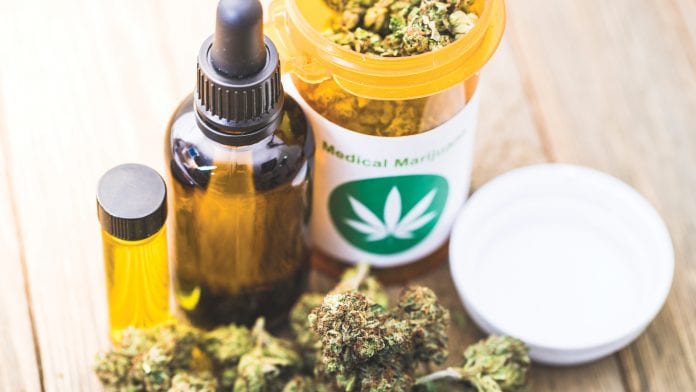
Despite the change in law, the government has failed on its promise to deliver access to potentially life-changing medicinal cannabis – The MS Society is demanding better.
For the past 15 years Paul has been in a continuous loop of trial and error, in search of an effective treatment for the constant pain and muscle spasms he lives with. Diagnosed with multiple sclerosis (MS) in the mid-2000s, Paul’s condition has deteriorated rapidly in the last three years. So far, no treatment or therapy has worked to ease his symptoms.
Paul, who is 48, has repeatedly asked for Sativex, a cannabis-based drug licensed for spasticity in MS. But because it’s not routinely offered on the NHS in England, Paul’s neurologist has not been able to prescribe it.
The law has led to nothing
When the UK government announced it would legalise cannabis for medicinal use in November last year, Paul thought he would finally be given access to a treatment that might bring him some relief. But the reality for Paul, and for many of the over 100,000 people living with MS in the UK, is that the law change has led to nothing but false hope and has failed to deliver what the government had promised.
Paul told us: “It makes me really angry that despite a change in the law, I still can’t get cannabis. I’ve been through so much trial and error over the years and I’m still in pain 24/7 with constant spasms.
“Cannabis might not work for me but unless I’m given the opportunity to try it then I’ll never know. Why bother changing the law unless it can actually be prescribed? It doesn’t make any sense to me.”
Clear benefits of medicinal cannabis for MS
In July 2017 the MS Society became the first major health charity in the UK to call for the legalisation of medicinal cannabis. This came after we reviewed the clinical trial data on the effectiveness of cannabis for MS, surveyed almost 4,000 people with MS about their attitudes to medicinal cannabis, and undertook a thorough policy review in consultation with our medical advisors.
Evidence shows that cannabis can work for some people with MS. Two evidence reviews in the journals Neurology and the American Academy of Neurology found that cannabis is effective at alleviating symptoms of MS such as muscle spasms or stiffness (spasticity) and pain.
The consensus of our medical advisors was that cannabis could improve the quality of life for around 10,000 people with MS who experience these symptoms.
And the chief medical officer’s government-commissioned review last summer concluded there is clear evidence of benefit for both pain and spasticity in MS.
Existing evidence is being ignored
Despite this, interim guidance commissioned by NHS England and published by the Royal College of Physicians in October recommended against the use of medicinal cannabis for people experiencing pain. And it didn’t address prescribing for spasticity in any great detail.
Subsequent guidance from the Association of British Neurologists on spasticity focused primarily on Sativex. But the National Institute for Health and Social Care (NICE) has deemed Sativex too expensive to be used by the NHS in England. It has been approved in Wales, but access there still continues to be a problem.
In the rest of the UK, requests for accessing Sativex on an individual basis – which can be made by clinicians who believe their patient has an ‘exceptional’ case – are routinely turned down by commissioners.
Access seems to be restricted
These issues point to where we currently are – a system that is not yet fit for purpose, with doctors being discouraged from prescribing and a limited range of products available.
Despite the welcome change in the law, we aren’t aware of anyone with MS who has been given NHS-funded access to unlicensed medicinal cannabis. We’re increasingly hearing from people with MS who are extremely frustrated at being denied cannabis for medicinal use.
We’ve also heard from clinicians about how challenging the process for prescribing is.
Neuro-pharmacists have told us there is limited information and advice available on how to source unlicensed cannabis-based medicinal products.
Senior clinicians in specialist MS centres have said they won’t be prescribing unlicensed products because there is no clarity on where and how to purchase such products, how they would be funded, or clear guidance on what and how much should be prescribed.
Specialist doctors are also required to take individual responsibility for requesting this kind of prescription, and they must gain approval from local committees before these medicines can be sourced.
The process for prescribing unlicensed products needs to be rigorous and should involve proper safety and quality considerations. But the current barriers and the lengthy processes involved are preventing people with MS from accessing medicinal cannabis.
There are two licensed cannabis-based products in the UK; however, they aren’t widely available. One is Nabilone, a synthetic THC drug used to treat nausea caused by chemotherapy. It can be prescribed to people with MS ‘off label’ (meaning outside its licence) to treat pain and spasticity. But access varies depending on where you live and whether a doctor would be willing to prescribe it.
The other is Sativex. As with Paul’s experience, most people can’t get a prescription on the NHS. A private prescription can cost £500 (~€584) a month, making the drug prohibitively expensive for many people with MS.
There is too much at risk
With no clear path to access medicinal cannabis, we know some people with MS feel their only option is to obtain the drug illegally. From our survey in 2014, over 40% of people who were using cannabis told us this was because they couldn’t get a prescription for a licensed drug to treat their symptoms.1
It’s simply not right that people are being driven to break the law to relieve their pain and spasticity. It’s also really risky when you’re not sure about the quality or dosage of what you’re buying.
John (not his real name), who is 44 and was diagnosed with MS in 2004, told us he had smoked cannabis in the past and it helped a great deal with his stiffness and pain. But he stopped because there were too many risks involved.
He said: “If I got caught there was too much at risk, I didn’t want to lose my job. Even just trying to get cannabis was stressful. And dosage wise, it was always the luck of the draw. Why should I have to put myself at risk to get a medication which can help me?”
We know too that smoking can cause MS to progress more rapidly, and our medical advisors have been clear that there is no clinical evidence surrounding the effectiveness of smoked cannabis.
Towards a fairer system
To provide longer-term guidance for health professionals on cannabis-based treatments, NICE has begun developing a clinical guideline which is expected to be open for consultation in the summer and published in October. We’ll be feeding in to the consultation process, making sure people with MS are involved in this process and the evidence for MS is properly reflected.
Encouragingly, NICE has said it will make recommendations on how cannabis-based medicinal products may be prescribed for people with pain and spasticity. NICE has also committed to looking at Sativex as part of this work, the first time it has done so since it rejected Sativex in 2014. This is a promising step which we hope will address the inequity of access to Sativex between Wales and the rest of the UK.
The change in the law was a landmark moment and a massive win for people with MS who campaigned for this change. But this is just one part of creating a system that will actually work for people with MS.
We want to see the UK government and health bodies throughout the country working with health professionals and patient organisations to improve access to medicinal cannabis.
We need a coherent system that further develops the current evidence base, expands treatment choice for people with MS, and provides more comprehensive guidance for prescribers and other health professionals.
We’re pleased that the Department of Health and Social Care has recently formed a working group on cannabis-based medicinal products, and we want to engage with this group to help tackle the challenges faced by people with MS.
Going forward we’re also pushing for:
- The publication of an agreed list of approved cannabis-based medicinal products that match the existing evidence and have a good safety profile
- The development of a secure and clear supply chain for these products
- Detailed guidance for clinicians and prescribers on when medicinal cannabis is appropriate for different patients alongside clear information on how to source these products.
There are still significant challenges that need to be overcome before we see meaningful change for people with MS. For Paul, John and many others, having an effective treatment to manage their pain and spasticity could have a massive impact on their quality of life. Getting access to the right treatment at the right time could transform thousands of people’s lives.
References
- MS Society (2017) Cannabis and MS [pdf] Available at: www.mssociety.org.uk/about-ms/treatments-and-therapies/complementary-and-alternative-therapies/cannabis
Genevieve Edwards
Director of External Affairs
MS Society
Tweet @mssocietyuk
www.mssociety.org.uk
Please note, this article will appear in issue 9 of Health Europa Quarterly, which will be available to read in April 2019.









It’s a real shame that people like Paul cannot at least trial this.
I’ve read a lot about the frustration and false hope that the law changes didn’t achieve what many thought they would.
Hopefully the guidance for clinicians can be strongly improved going forward.